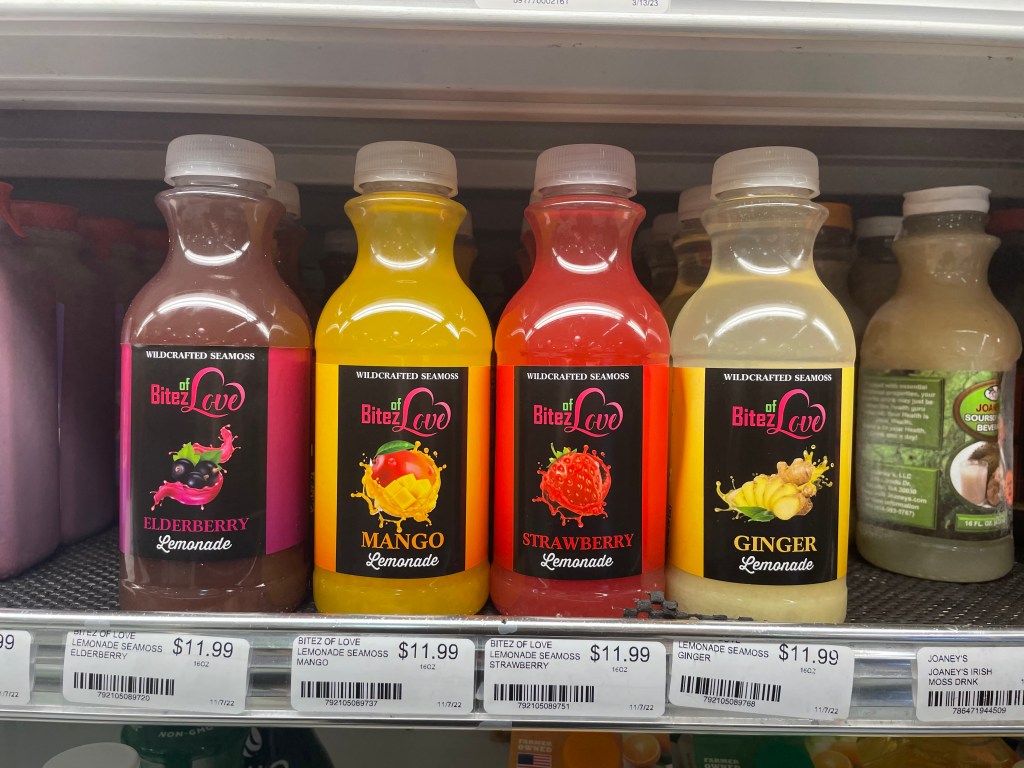
Algae may not be the first thing you think of when it comes to healthy juices or summertime drinks, but a new generation of local foodpreneurs—many of whom are Black women—is betting that sea moss just might be the next spirulina.
If you’ve wandered the aisles of a health food store recently, alongside ashwaganda root and camu camu berries, you may have come across the red seaweed also known as Irish moss or Chondrus crispus either in its raw form or processed into juices, gels, and gummies. Imported mainly from the Caribbean, sea moss and its cousin, bladderwrack, are increasingly popular natural ingredients for chefs and cooks all over Atlanta.
Schelene Kelso, a classically trained executive chef with more than three decades of industry experience, launched her company, Bitez of Love, during the pandemic. Intensely aware of the suffering all around her, she says she was looking for some type of healing in that moment. She had been dealing with painful inflammation for a long time and her husband, a smoker, was deeply congested. One day, a friend of her son happened to bring home a sea moss concoction, and the rest was history.

“It was horrible,” Kelso recalls of the taste. “But it helped my husband get rid of his congestion. He took sea moss for six weeks and it cleared it right out.”
Initially, she says, no one seemed to enjoy the texture but suffered through it for the health benefits. It took a lot of tinkering in the kitchen to get the recipe just right. Because most people tend not to like the briny, fresh-from-the-ocean taste of sea moss, it helps to use some kind of acid, Kelso says. That’s how she came up with the idea of making sea moss lemonade.
Kelso painstakingly renders fresh sea moss—sourced from St. Lucia—by hand until it assumes a partly gelatinous texture, not unlike the SCOBY (symbiotic culture of bacteria and yeast) that’s often suspended in kombucha, before mixing it into flavored lemonades that include strawberry, mango, ginger, elderberry, and soursop.
Her sea moss lemonades are on sale at markets around town, from Sevananda, the oldest natural foods market and co-op in the city, to younger shops like Fresh From Earth Herb & Tea Bar in College Park. Kelso also sells them on her website, alongside sea moss in raw form and in gels that come in flavors from strawberry, mango, and ginger and turmeric to a “SuperGel” that features elderberry, burdock and bladderwrack. She says that the reaction has been positive thus far, though it can be hard to break into certain markets in other parts of town.

(The site’s tantalizing claim that sea moss “contains 92 out of the 102 minerals that our body needs” is tempered by a disclaimer that cautions potential customers against consuming too much, including potential side effects such as “iodine poisoning or thyroid problems.” Depending on where it’s sourced from, there’s also the possibility that sea moss may contain unhealthy concentrations of heavy metals.)
Sevananda features perhaps the most extensive array of sea moss products from local vendors, including Herb n Flow’s sea moss lemonades and gels; Black Mountain’s purple Jamaican sea moss drinks (Tropical and Fruit Punch); a variety of flavored gels from Melanin Moss, which even has its own mascot, the Moss Boss; and a wide assortment of Bush Doctah’s dried sea moss and bladderwrack, wildcrafted in Jamaica, which claims to flush mucus from the body and increase libido. (“Jamaican proverb: Every tub has to sit own its own bottom.”) The brand’s alkaline sea moss mix features purple sea moss, alkaline water, Jamaican soursop, and cinnamon leaves.
Wadada, a healthy market and juice bar in the West End, is also well-stocked. Alongside a wide selection of sea moss products, owner Jeanette Sellers offers superfood sea moss smoothies in flavors like Pina Passion (pineapple, banana, ginger); Maca Veli (maca, cantaloupe, ginger); and Life is Golden (turmeric and mango). Sellers, who launched Wadada in 2019, says that sea moss was part of her vision from the very beginning.
“Since its inception, our signature at Wadada has been superfood sea moss smoothies,” Sellers told me. “Sea moss plays a great role in re-mineralization of the body, which is key to great health.”
She takes pride in the integrity of her ingredients, sourcing wildcrafted sea moss from St. Lucia, St. Vincent, Jamaica, and from as far away as Tanzania. “Our sea moss purveyors have been providing a reputable product from clean, trusted waters for decades,” Sellers says. “We find it immensely important to support indigenous commerce and locals that have been in the business before the sea moss boom. Too many opportunistic companies looking to ride the wave and make a quick dollar can result in an inferior product.”

Inspired by the way her community has persevered despite “the inequities within the food system,” Sellers says that sea moss is one part of a movement whose overall mission is “to address this unfortunate reality and advance health and wellness in underserved communities.”
At the same time, we should remember that sea moss, which is already popular with celebrities and social media influencers, has long been an established ingredient in Caribbean culinary and healing traditions.
“It’s been a staple in the Caribbean for ages but is just now gaining popularity,” Sellers says. “We are now starting to see sea moss being incorporated into much bigger brands. It’s still on the rise and there is still a lot to unlock in terms of benefits. Sea moss has definitely taken the world by storm. It’s so great for sexual health that I anticipate it remaining a force for some time to come.”
